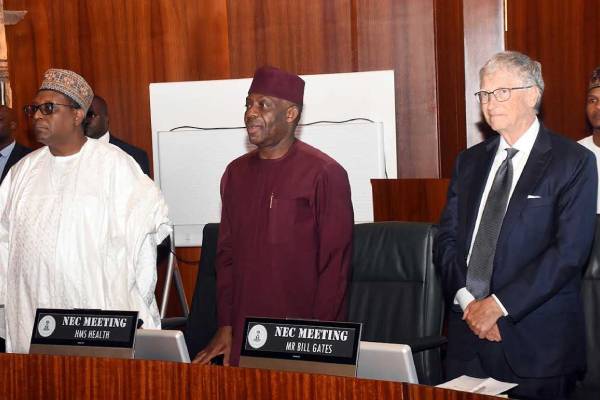By Muhammad Amaan
Co-Chair of the Bill and Melinda Gates Foundation, Bill Gates has tasked the federal and state governments to prioritise funding the health sector to secure the future of Nigerians.
Gates said this in his presentation to the National Economic Council (NEC) meeting on Wednesday, presided over by Vice-President Kashim Shettima at the State House, Abuja.
He said President Bola Tinubu’s Renewed Hope agenda, though ambitious, would need to deploy limited funds judiciously.
“Without health, there can be no opportunity. After all, priorities without funding are only words. And I know that right now, it’s impossible to give every priority the funding it needs.
“That’s why it’s more important than ever to focus on the areas you know will make the greatest difference,” said Gates.
He explained that in two decades, the world had reduced the number of children who died before their fifth birthday by half as a result of investments in primary healthcare such as routine immunisation.
However, he said in Nigeria, 2.2 million children had never received a single vaccine.
“I think you’ll agree that if children aren’t immunised against deadly diseases, little else matters.
“Primary care is the first – and sometimes, the only – point of contact most patients have with the health system. Yet, Nigeria spends just N3,000 on primary healthcare per person, per year.
“About 70 per cent of your spending goes to secondary and tertiary care, compared to just 30 per cent for primary care,” he said.
Gates urged both the federal and state governments to put in more efforts to reverse the ratio.
“It’s up to each state to not only prioritise primary health in your budgets but also follow through on releasing the funds on time.
“Realistic budgeting also requires good data. Data can reveal uncomfortable truths. But no country can plan for the future without understanding the present.
“Without a realistic plan, health systems break down. Salaries don’t get paid. Equipment doesn’t get maintained. Supplies don’t show up. And over time, patients give up on seeking care altogether,” Gates noted.
He said President Bola Ahmed Tinubu’s administration had already taken a big step toward a stronger primary health system, by implementing an ambitious Sector-Wide Approach.
He said the reforms would ensure that every naira spent on healthcare was used wisely.
He said the reforms could only reach their full potential if states lived up to their obligations under Nigeria’s Health Sector Renewal Compact, and release their part of the funding.
“I understand all this is easier said than done. But Nigeria has already proven it can make enormous progress on primary health in a short time.
“Last year, the federal government launched an ambitious HPV vaccination campaign.
“In one month, Nigeria immunised more girls than 40 other Gavi countries combined did the entire previous year. In total, Nigeria reached more than 12 million girls with this life-saving vaccine.
“That’s genuinely incredible. And I hope you carry the lessons from that campaign to future efforts,” he said.
Gates also called for investments in nutrition, which he said was the root cause of nearly half of all children’s deaths.
“When children are malnourished, they’re more vulnerable to deadly diseases. Even the children who survive malnutrition never escape it.
“It stunts their brains and bodies in ways that can’t be reversed. And new data show that nearly one-third of Nigerian children suffer from stunting,” he explained.
However, he said there was reason to be optimistic as Nigeria had already mandated that staple ingredients like cooking oil and wheat flour were fortified with essential nutrients.
He added that researchers were working to fortify bouillon cubes, and that if scaled up, the bouillon cubes could save 11,000 lives and prevent over 16 million cases of anaemia each year.
He further said that even though companies were already mandated to fortify some staples, many were not fully complying.
“Private sector partnership is crucial here. While your immediate priorities may differ, government and business leaders all want the same thing: a healthier, wealthier Nigeria.
“You can convene business leaders and encourage them to meet mandates. You can work with them to make nutritious foods more affordable and available.
“Then it’s up to you to ensure the food your states procure through social assistance programmes meets the proper standards,” said Gates.
He said all the solutions he proffered required investment in terms of time and money, and that no government could do this alone.
He added that partnership was important, and it was imperative for the private sector to support health and nutrition.
“I hope you know you also have a partner in the Gates Foundation. For over two decades, our grantees have helped solve some of the most intractable problems in all the areas I’ve discussed.
“Our commitments to Nigeria and to Africa have only grown over the years. And I look forward to many more years of partnership,” Gates promised.




